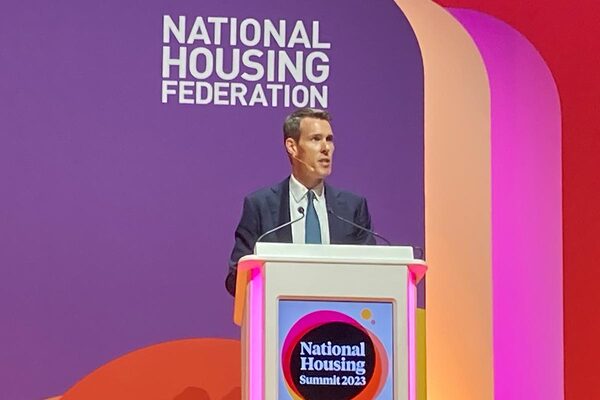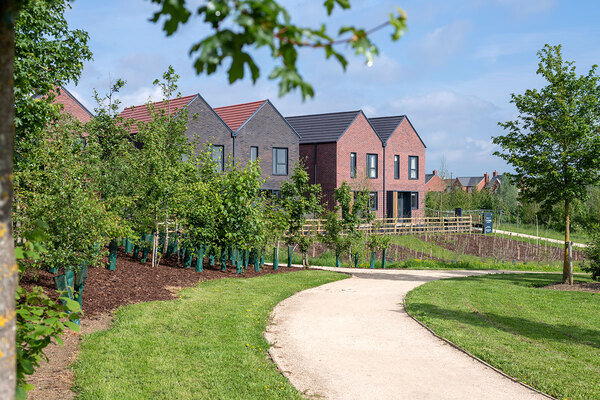You are viewing 1 of your 1 free articles
Labour manifesto promises to prioritise and protect new social rented homes
Labour’s general election manifesto has promised to prioritise and increase protections on newly built social rented homes, alongside pledging more devolution to combined authorities and steps to improve building safety.
Launching the manifesto earlier today, Labour leader Sir Keir Starmer said that his party does not “have a magic wand… but what this manifesto represents is a credible, long-term plan”.
Alongside a commitment to social housing, that plan includes a promise to develop a new cross-government strategy, working with mayors and councils, to “put Britain back on track to ending homelessness”.
It was reported at the end of last month that Labour was considering a manifesto pledge to tackle the UK’s homelessness crisis with a national expansion of Housing First, but there was no mention of it in the manifesto.
However, in government the party would also “immediately abolish Section 21 ‘no fault’ evictions”.
The pledge to protect social housing stock came as part of Sir Keir’s target to deliver “the biggest increase in social and affordable housebuilding in a generation”.
Published on 13 June, the manifesto document said that Labour will “prioritise the building of new social rented homes and better protect our existing stock” by “reviewing the increased Right to Buy discounts introduced in 2012 and increasing protections on newly built social housing”.
Last year, nearly three times more social homes were sold off or demolished than were built, and the shadow housing minister has previously told Inside Housing that Labour wants to go “net positive” on new social rented homes within the “very early years of the next parliament”.
The manifesto explained how Labour will “strengthen planning obligations” to ensure new developments provide more affordable homes, make changes to the Affordable Homes Programme (AHP) to “ensure that it delivers more homes from existing funding”, and support councils and housing associations to build their capacity and “make a greater contribution to affordable housing supply”.
A total of 1.5 million new homes of all tenures were promised over the next parliament. To achieve this goal, Labour said it would “immediately update the National Planning Policy Framework to undo damaging Conservative changes”, including restoring mandatory housing targets for councils.
Paul Dolan, chief executive of Riverside, said: “For too long housing has been overly politicised. To tackle the housing crisis we need all parties and providers to commit to a long term plan for housing.
“Reintroducing the right local housing targets will help to incentivise the need to deliver more housing and an initial £20m boost to the planning system will go some way to unlocking blockages in the development pipeline.”
Mr Dolan also described it as encouraging to “see from Labour a commitment to a continued AHP, but as the economy grows we need to see a significant step change in investment in social and affordable homes”.
Sir Keir’s government would support local authorities by funding additional planning officers, through increasing the rate of the stamp duty surcharge paid by non-UK residents.
The release of lower-quality ‘grey belt’ land will be prioritised, with ‘golden rules’ on housing that include a delivery target of 50% affordable. The manifesto also reiterated Labour’s commitment to a “new generation of new towns”, inspired by the 1945 Labour government.
New mechanisms for cross-boundary strategic planning were also promised to plan for “growth on a larger-than-local scale”. Combined authorities will be given new planning powers along with “freedoms and flexibilities to make better use of grant funding”.
Labour pledged to reform compulsory purchase compensation rules to “improve land assembly; speed up site delivery; and deliver housing, infrastructure, amenity and transport benefits in the public interest”.
On building safety, the manifesto said: “Labour will also take decisive action to improve building safety, including through regulation, to ensure we never again see a repeat of the Grenfell fire.
“We will review how to better protect leaseholders from costs and take steps to accelerate the pace of remediation across the country. We will put a renewed focus on ensuring those responsible for the building safety crisis pay to put it right.”
The second and final report on the Grenfell Tower fire will be published on 4 September.
On leasehold, the manifesto said Labour would “finally bring the feudal leasehold system to an end”. To do this, ministers will ban new leasehold flats, ensure commonhold is the default tenure, and enact the Law Commission proposals on leasehold enfranchisement, right to manage and commonhold.
The manifesto also promised to “tackle unregulated and unaffordable ground rent charges” and bring “the injustice of ‘fleecehold’ private housing estates and unfair maintenance costs to an end”.
Harry Scoffin, founder of campaign group Free Leaseholders, said: “Labour has made it abundantly clear that it is curtains for residential leasehold. Leaseholders were badly shortchanged by the departing Tory government in the wash-up. We are calling on Labour to deliver these long awaited reforms in their first King’s Speech and expedite key provisions of the recently passed 2024 Act.”
In addition, Labour “will ensure local communities continue to shape housebuilding in their area, but where necessary Labour will not be afraid to make full use of intervention powers to build the houses we need”.
Matt Downie, chief executive of Crisis, said: “It is hugely welcoming to see the Labour Party recognising the desperate need for a cross-government strategy to end homelessness. The situation across Britain is stark. Homelessness is rising and with it come damaging consequences that can last for generations.
“This level of aspiration to rebuild our depleted housing stock, with a priority on social housing, and bring down homelessness by drawing on the expertise of local communities is a game-changer in our mission to tackle one of the greatest injustices of our time.”
Earlier this week, the party launched a mortgage guarantee scheme that said it will support more than 80,000 young people to get on the housing ladder over the next five years.
Andy Hulme, chief executive of Hyde, said: “It is heartening to hear renewed commitments to a plan for the biggest boost to social and affordable housing in a generation. It is about time housing became a key issue in the general election campaign – our nation’s lack of housing undermines people’s ability to start and raise a family, build a career and put down roots in communities for the long term.
“We desperately need to boost the supply of social and affordable homes in England.”
Kate Henderson, chief executive of the National Housing Federation, said: “Building social homes at scale will change lives, strengthen communities, boost growth and save the taxpayer money. Housing associations stand ready to deliver this, but will require long-term commitment and sustained investment from the next government to do so.
“We’re therefore delighted to see Labour’s manifesto pledge to support councils and housing associations to build their capacity to ensure more social homes can be built. This is a vital first step towards ending the housing crisis.”
Sign up for our daily newsletter
Already have an account? Click here to manage your newsletters












